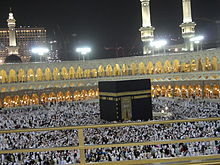
Islam is the official religion of Saudi Arabia and the Quaran is the constitution. The legal system is based on an official interpretation of Islam based on the Hanabali school of Sunni jurisprudence. The approximate population of Saudi Arabia is 27 million and 80 to 90 percent of the population adheres to Sunni traditions. Approximately 10 to 15 percent of the population is Shia. There is virtually no religious freedom and the practice of any religion other than Islam is prohibited; however, the government generally allows the private practice of other religions.
Muslims who do not adhere to the government’s interpretation of Islam faced political, economic, legal, and religious discrimination. The government has detained individuals for insulting Islam. Proselytizing is forbidden in Saudi Arabia.
Saudi Arabia appreciates its custodianship of the two Holy Mosques in Mecca and Medina. Construction of religious buildings other than mosques is prohibited. The government is financially responsible for all Sunni mosques in Saudi Arabia—a total of over 60,000 buildings. To deliver sermons, Imams must be government-approved. Imams also receive payment from the government for their services.
Children born to Muslim fathers are determined Muslim by law and conversion from Islam is considered apostasy, which is punishable by death. Blasphemy against Islam is also punishable by death.
In accidental death or injury proceedings, non-Muslim plaintiffs are only entitled to receive a fraction of compensation their Muslim counterparts receive. Judges may refuse to believe non-Muslim individuals in favor of Muslim testimony. In capital punishment cases, a woman’s testimony only counts as one-half of that of a man’s.
The government requires noncitizen legal residents to carry identification cards that states whether they are Muslim or non-Muslim. In order to naturalize, non-Muslims must convert to Islam.